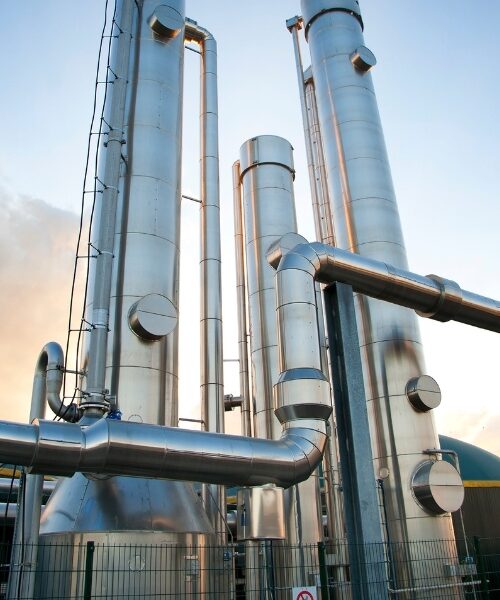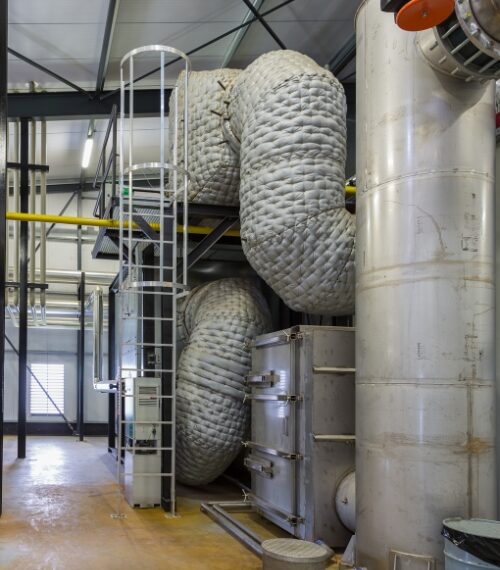Leading Combined Heat & Power Technology
Enquiry Form
Call now to
Enquire About CHP System Service
Looking for a reliable, cost-effective energy solution? CHP Plant provides high-efficiency Combined Heat and Power (CHP) systems that generate electricity and heat from a single fuel source, optimising energy use and lowering operational costs. CHP captures waste heat and repurposes it, supporting sustainability and enhancing energy security for businesses with steady power needs. At CHP Plant, we customised each CHP system to meet specific requirements and align them with energy-saving and environmental goals. Understanding how CHP works demonstrates its value for energy-conscious businesses.
What is Combined Heat and Power (CHP)?
CHP, or Combined Heat and Power, is a system that generates both electricity and heat from one fuel source, increasing energy efficiency. CHP provides power and heating for commercial, industrial, and residential setups by capturing and reusing heat typically lost in traditional systems. This efficiency supports significant energy savings, especially for operations needing consistent heating and power.
How Does CHP Work to Produce Both Heat and Electricity?
CHP systems produce electricity by converting fuel, like natural gas or biomass, into mechanical energy using turbines or engines. The system captures and repurposes waste heat, creating a continuous heat supply for heating systems or steam for industrial needs. This setup optimises energy use, making CHP ideal for facilities needing high and constant heating, such as hospitals and industrial sites, where it outperforms traditional power generation.

How Does CHP Compare to Traditional Power Generation Methods in Terms of Efficiency?
CHP systems achieve about 80% efficiency compared to around 50% in traditional methods, where waste heat is unused. CHP’s heat capture reduces fuel consumption, yielding cost and energy savings. This efficiency makes CHP appealing to organisations that are prioritising sustainability and cost-effective energy, with specific system types available for different applications.
What Are the Main Types of CHP Systems, and How Do They Differ?
CHP systems vary to meet different energy needs:
- Gas Turbine CHP Systems: Gas turbines supply high power and heat for large industrial settings with continuous demand.
- Steam Turbine CHP Systems: Steam turbines convert thermal energy to mechanical power, ideal for facilities with high thermal requirements, such as power plants.
- Reciprocating Engine CHP Systems: Reciprocating engines offer flexibility for medium-sized applications, allowing scalability and efficiency.
- Micro-CHP Systems: Using fuel cells or Stirling engines, micro-CHP units provide localised power and heat for small businesses or residential use.
These options let facilities select a system based on energy requirements, supporting various users.
What Types of Businesses Benefit the Most from CHP Systems?
Manufacturing, healthcare, education, and data centres benefit most from CHP systems because they need steady power and heat. Facilities relying on continuous energy find CHP valuable for cost savings and reliability. Micro-CHP systems also support residential users and small businesses, lowering grid dependency. This efficient and reliable energy production also brings environmental advantages.
What Are the Environmental Benefits of Using CHP?
CHP reduces greenhouse gas emissions by capturing and reusing waste heat, decreasing fossil fuel use for the same energy output. Many CHP systems also run on renewable fuels like biogas, which further lowers emissions, making CHP suitable for organisations with environmental targets. These environmental gains also contribute to cost reductions, enhancing CHP’s appeal to cost-conscious businesses.
How Much Can a Business Save on Energy Costs by Using a CHP System?
CHP helps businesses cut energy costs by generating electricity and heat on-site, reducing reliance on external sources. Savings vary based on demand, fuel, and system size, but many companies recover their investment quickly through lower utility bills. The financial advantages make CHP attractive, especially for high-demand sectors, with installation costs a key next consideration.
What Are the Installation Costs and Payback Period for a CHP System?
CHP installation costs depend on system size, complexity, and location, with typical costs ranging from $1,433 per kilowatt for large systems to $2,900 per kilowatt for smaller commercial setups. The payback period generally ranges from 3 to 7 years, affected by energy prices and demand. This rapid return makes CHP viable for businesses with sustained energy needs, while fuel flexibility adds appeal.
What Fuel Sources Can Be Used in CHP Systems?
CHP systems can operate on natural gas, biomass, biogas, and hydrogen, allowing businesses to choose cost-effective, sustainable options. This flexibility supports a range of uses, letting companies select fuels based on availability, cost, and environmental goals. Renewable fuel integration also enhances reliability in CHP systems.

Can CHP Systems Be Integrated with Renewable Energy Sources Like Solar or Wind?
CHP can integrate with renewables like solar or wind, providing consistent power when renewable sources fluctuate. This hybrid model ensures a continuous energy supply, making CHP beneficial for businesses needing stable, reliable power. For industries prioritising stability, the reliability and maintenance of CHP systems are important factors.
How Reliable Are CHP Systems, and What Maintenance Is Required?
CHP systems offer high reliability when properly maintained, which includes regular inspections, part replacements, and system tests to ensure performance. This reliability is essential for industries like healthcare and manufacturing, where continuous energy is crucial. This consistent energy supply also supports reduced greenhouse gas emissions.
How Do CHP Systems Reduce Greenhouse Gas Emissions?
CHP reduces emissions by reusing heat from waste and decreasing fuel use for energy production. By generating less CO₂ per energy unit, CHP aligns with environmental goals and standards, making it ideal for businesses reducing their carbon footprint. Selecting the right CHP system size helps maximise these advantages.
What Are the Primary Considerations for Selecting the Right CHP System Size?
Selecting the correct CHP system size depends on energy needs, available space, and fuel type. A well-sized system ensures efficient energy use without waste, optimising cost savings and performance. Proper sizing is vital for large facilities with complex needs during installation planning.
How Long Does It Take to Install a CHP System?
CHP installation typically takes several months, depending on the system’s size, site needs, and complexity. The process includes evaluations, planning, and integration, ensuring the system operates smoothly post-installation. Effective planning makes CHP systems ready for use, and many companies find scalability helpful as their energy needs grow.
Is It Possible to Scale Up a CHP System as Energy Demands Grow?
Yes, CHP systems allow for scalability, letting businesses add units or components to meet increased demands. This flexibility enables companies with growing energy needs to adjust capacity without a major overhaul. This scalability enhances long-term energy security, particularly for sectors with critical power requirements.
How Does a CHP System Impact a Business’s Overall Energy Security?
CHP systems provide energy security by generating power on-site, reducing grid dependency and ensuring stable power during outages. This reliability is valuable for industries needing continuous power, and regulatory compliance is essential for CHP installations.
What Regulations or Permits Are Needed to Install a CHP System?
CHP installations often require permits for environmental and safety standards, which vary by location. Working with local authorities ensures compliance, smoothing the process and avoiding delays. Regulatory awareness helps with smooth implementation, although daily operations present other challenges.
What Are the Primary Challenges in Operating a CHP System?
Operating a CHP system requires managing fuel cost variability and regular maintenance by trained personnel. Renewable options like biogas reduce cost unpredictability, improving CHP’s viability. This operational adaptability makes CHP ideal for companies that are incorporating sustainable practices.
How Does CHP Fit into a Business’s Long-Term Sustainability Plan?
CHP aligns with sustainability goals by reducing emissions and energy expenses and supporting environmental responsibility. Implementing CHP demonstrates a business’s eco-commitment, building its reputation as a sustainability leader.
Why Choose CHP Plant for Your CHP System Service?
CHP Plant is a reliable partner for CHP systems, offering complete services from consultation to maintenance. We emphasise efficiency, reliability, and sustainability, tailoring each CHP system to specific energy needs. Our team stays current on CHP technologies and guides clients to solutions that maximise savings and minimise environmental impact. With CHP Plant, you get a trusted partner committed to unlocking CHP’s full potential for your business.
